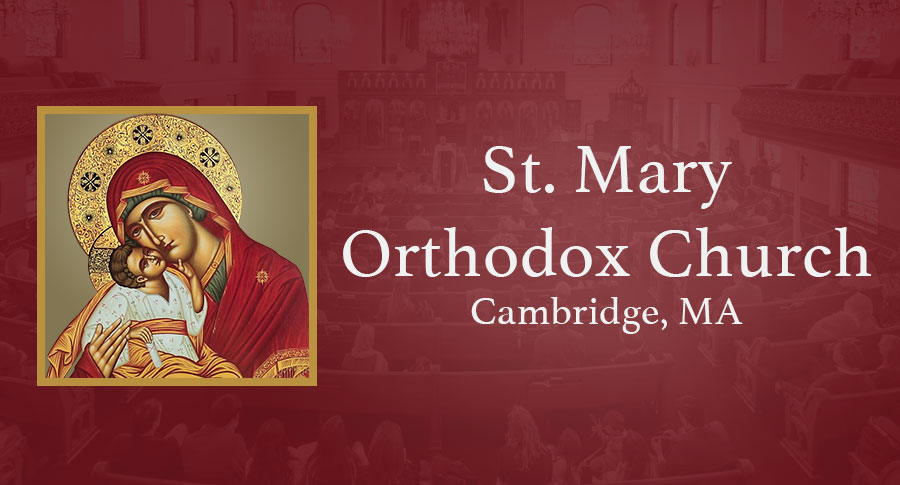Sermons from St. Mary Church
Watering Seeds of Virtue
October 01, 2007 - by Fr. Antony Hughes
Sermon Preached by Fr
Belief and Faith
September 24, 2007 - by Fr. Antony Hughes
Sermon Preached by Fr
The Sunday after the Elevation of the Holy Cross
September 17, 2007 - by Fr. Antony Hughes
Sermon Preached by Fr
The Sunday before the Elevation of the Holy Cross
September 10, 2007 - by Fr. Antony Hughes
Sermon Preached by Fr. Antony Hughes on Sunday, September 9, 2007 In the Name of the Father and of the Son and of the Holy Spirit, one God
Many are Called, Few are Chosen
September 03, 2007 - by Fr. Antony Hughes
Sermon Preached by Fr. Antony Hughes on Sunday, September 2, 2007 In the Name of the Father and of the Son and of the Holy Spirit, one God
The Light and the Law
July 16, 2007 - by Fr. Antony Hughes
Sermon Preached by Fr. Antony Hughes on Sunday, July 15, 2007 In the Name of the Father and of the Son and of the Holy Spirit, one God
Matthew 9:1-6
July 09, 2007 - by Fr. Antony Hughes
Sermon Preached by Fr. Antony Hughes on Sunday, July 8, 2007 In the Name of the Father and of the Son and of the Holy Spirit, one God
If the Eye is Sound
June 18, 2007 - by Fr. Antony Hughes
Sermon Preached by Fr. Antony Hughes on Sunday, June 17, 2007 In the Name of the Father and of the Son and of the Holy Spirit, one God
On the Sunday of All American Saints
June 11, 2007 - by Fr. Antony Hughes
Sermon Preached by Fr. Antony Hughes on Sunday, June 10, 2007 In the Name of the Father and of the Son and of the Holy Spirit, one God
On the Sunday of All Saints
June 04, 2007 - by Fr. Antony Hughes
Sermon Preached by Fr. Antony Hughes on Sunday, June 03, 2007 In the Name of the Father and of the Son and of the Holy Spirit, one God
The Blind Man
May 14, 2007 - by Fr. Antony Hughes
Sermon Preached by Fr. Antony Hughes on Sunday, May 13, 2007 In the Name of the Father and of the Son and of the Holy Spirit, one God
At the Pool of Bethesda
April 30, 2007 - by Fr. Antony Hughes
Sermon Preached by Fr. Antony Hughes on Sunday, April 29, 2007 In the Name of the Father and of the Son and of the Holy Spirit, one God
The Ministry of the Myrrhbearers
April 23, 2007 - by Teva Regule
Sermon Preached by Teva Regule on the Sunday of the Myrhhbearing Women - April 22, 2007 Christ is Risen! Indeed, He is Risen! I never knew
On the Service of Holy Unction
April 05, 2007 - by David Vermette
Sermon Preached by David Vermette on Holy Wednesday - April 4, 2007 In the Name of the Father and of the Son and of the Holy Spirit, one God
On Palm Sunday
April 02, 2007 - by Fr. Antony Hughes
Sermon Preached by Fr. Antony Hughes on Sunday, April 1, 2007 In the Name of the Father and of the Son and of the Holy Spirit, one God
On the Feast of the Annunciation
March 26, 2007 - by Fr. Antony Hughes
Sermon Preached by Fr. Antony Hughes on Sunday, March 25, 2007 In the Name of the Father and of the Son and of the Holy Spirit, one God
Lay Up For Yourselves Treasures in Heaven
February 19, 2007 - by Fr. Antony Hughes
Sermon Preached by Fr. Antony Hughes on Sunday, February 18, 2007 In the Name of the Father and of the Son and of the Holy Spirit, one God
On Meatfare Sunday
February 12, 2007 - by Fr. Antony Hughes
Sermon Preached by Fr
On the Sunday of the Prodigal Son
February 05, 2007 - by Fr. Antony Hughes
Sermon Preached by Fr. Antony Hughes on Sunday, February 4, 2007 In the Name of the Father and of the Son and of the Holy Spirit, one God
On the Sunday of the Pharisee and the Publican
January 29, 2007 - by Fr. Antony Hughes
Sermon Preached by Fr. Antony Hughes on Sunday, January 28, 2007 In the Name of the Father and of the Son and of the Holy Spirit, one God
